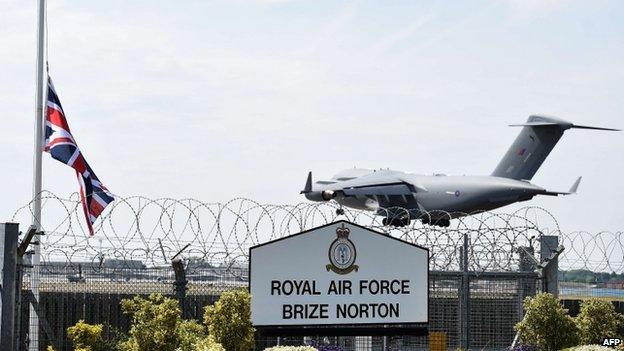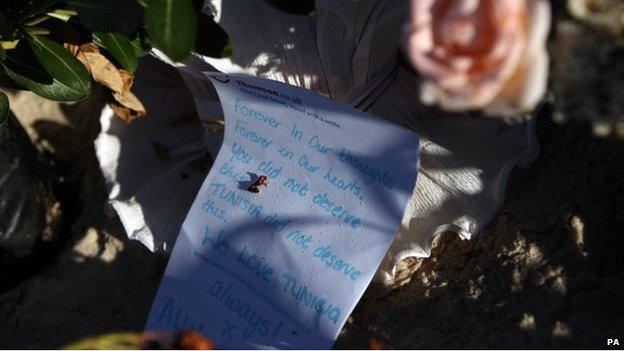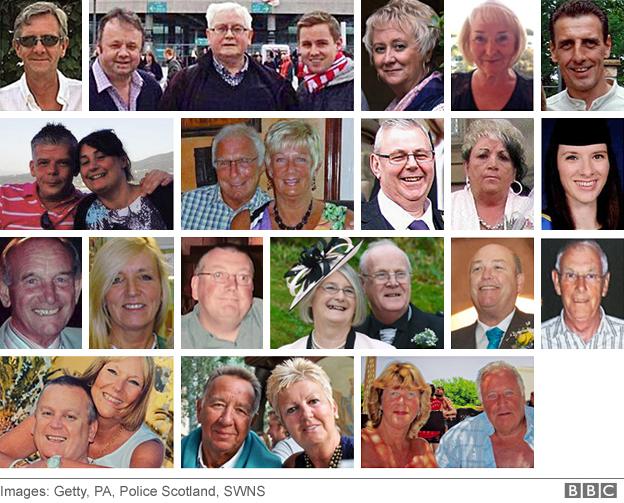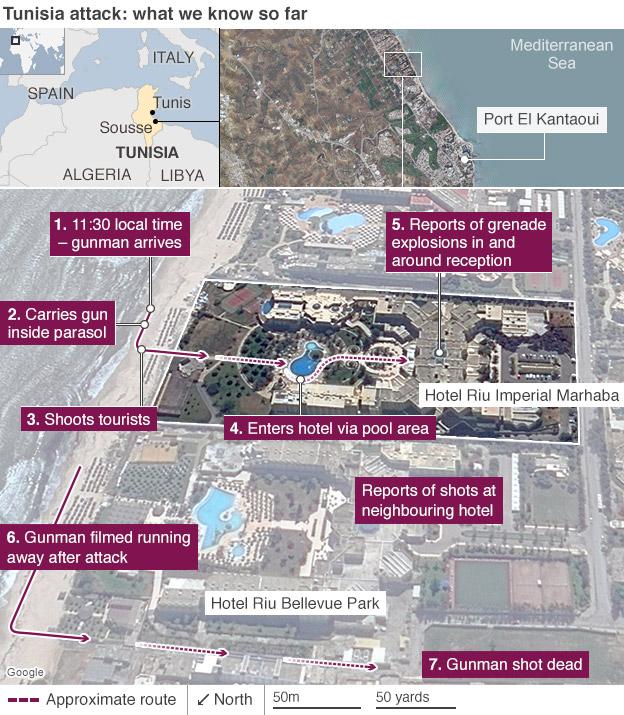Tunisia attack: RAF plane brings first UK dead home
- Published
The BBC's Robert Hall: "No flags, just simple bouquets of white flowers, as one by one the coffins were carried to the waiting hearses"
The first bodies of some of the British tourists shot dead in the Tunisia beach attack have arrived back in the UK.
Eight coffins were flown from Tunis to Brize Norton, Oxfordshire, on an RAF C17 and taken off the plane one by one.
Twenty-nine of the 38 people killed are now confirmed to have been British. The repatriation of all the bodies is likely to take several days.
Post-mortem examinations will be carried out before the bodies are released to the families.
The government says a further body awaiting identification is believed to be that of a Briton.
The bodies on the flight to Brize Norton, which arrived at 15:00 BST, were those of relatives Adrian Evans, Charles (known as Patrick) Evans and Joel Richards, as well as Carly Lovett, Stephen Mellor, John Stollery, Denis Thwaites and Elaine Thwaites.

The C17 took off from Tunis military base on Wednesday lunchtime bound for RAF Brize Norton
As the plane landed, a statement was released on behalf of Suzanne Richards for the Evans and Richards families, which said: "We are a very small and normal family, but nothing will ever be normal again.
"My son Joel, dad Pat and brother Adrian were our rocks and we are all heartbroken and devastated and will never get over losing them."
Eight hearses left Brize Norton in convoy on Wednesday evening bound for West London where the bodies will be handed over to the coroner.

All eight hearses travelled in convoy to London
The chief coroner for England and Wales, Judge Peter Thornton QC, said there would be "one investigation and one inquest for each deceased, although, in view of the circumstances of the killings, the inquests are likely to be held together".
Downing Street has ruled out an inquiry into the attack, but said Scotland Yard would assist the Tunisian investigation.
A minute's silence will be observed across the country at noon on Friday in memory of the victims, and matches at Wimbledon will start later so players, spectators and staff can take part.

Flowers and letters of condolence continue to be left at the scene of the attack
Tunisian authorities have arrested several people on suspicion of helping gunman Seifeddine Rezgui and at least two other suspects are wanted by police.
The 23-year-old student, who had links to the Islamic State jihadist group, was shot dead by police after the killings on the beach in Sousse last Friday.
Security sources say he is thought to have been trained in Libya at the same time as two men behind the Bardo museum attack in Tunis that left 22 people dead in March.
Tunisia's interior ministry spokesman, Mohamed Ali Laroui, said preliminary investigations indicated that all the bullets recovered from the dead and injured had come from the same weapon, suggesting only one gunman had been involved.

Tunisia beach attack: The victims

Most of the Britons killed have now been named. Here's what we know about those who lost their lives, as well as those still unaccounted for and the injured.
Survivors have also been speaking about their ordeal.

The RAF flew the last four seriously injured Britons back to the UK on Tuesday and they are now in hospital undergoing treatment.
The specially modified plane flew into Birmingham Airport, where Allison Heathcote, 48, from Felixstowe in Suffolk, was taken off and transported to the city's Queen Elizabeth Hospital.
Mrs Heathcote's husband Philip has been confirmed as dead. She has undergone five hours of surgery after suffering multiple gunshot wounds.
Updated advice
A hospital spokesman said Mrs Heathcote remains in a "critical but stable condition, under sedation".
The other injured patients were flown to RAF Brize Norton, and Downing Street said they were being treated at John Radcliffe Hospital in Oxford, Derriford Hospital in Plymouth and London's St Mary's Hospital.
The Foreign Office has updated its travel advice, external to warn that further terrorist attacks in Tunisia are possible.
Three Irish people, two Germans, one Belgian and one Portuguese victim have also been identified as among the dead.

Background and analysis
The BBC's Ben Brown and Rana Jawad in Sousse report on what is known about the gunman's final moments
What we know so far
Special report on the Tunisia attack
Profile of gunman Seifeddine Rezgui
Tributes have been paid to victims in England, Wales, Scotland and Northern Ireland


We are seeking your stories relating to the Tunisia attacks. If you or anyone you know has been affected please contact us in the following ways.
Please include a contact number if you are willing to speak to a BBC journalist.
WhatsApp: +44 7525 900971
Tweet: @BBC_HaveYourSay, external
Send an SMS or MMS to 61124